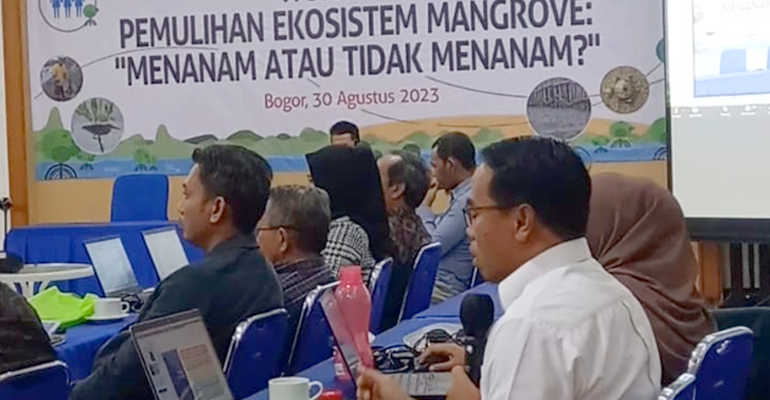PKSPL IPB University Organizes Workshop on Mangrove Ecosystem Recovery

IPB University’s Center for Coastal and Marine Resources Studies (PKSPL) held a Workshop: Mangrove Ecosystem Recovery with the topic “To plant or not to plant?”, 30/8.
Prof Yonvitner, Chairman of the Center for Coastal and Marine Resources Studies (PKSPL) IPB University, said that mangroves are like beautiful women (mothers) and are always alluring. So, he said, there are many who want to utilize and want to be children to take care of.
“So, which mangroves will we restore, and how much and how long should we restore?” said Prof Yonvitner, the initial spark in the discussion.
The IPB University lecturer continued, in publishing mangrove landscape areas, it is necessary to communicate with stakeholders, both government, private, community and academics. Thus, all parties can contribute to the management and or rehabilitation of mangroves.
Indeed, said Prof Yonvitner, mangroves have long-term functions and benefits for coastal communities, both ecologically and economically. Therefore, there is a need for activities that can provide comprehensive information to the community and provide a complete view of the mangrove ecosystem.
Mangroves play an important role in achieving Sustainable Development Goals (SDGs) pillar 14, which focuses on the sustainable management of our oceans and coasts. Not only are mangroves of immense value to local communities, but also the aspect of restoring mangroves will support the achievement of many other SDGs, including eradicating poverty and hunger (SDG 1 and SDG 2), ensuring livelihoods and economic growth (SDG 8), taking action against the impacts of climate change (SDG 13) and halting biodiversity loss (SDG 15).
“In community-based mangrove ecosystem management, Indonesians still favor rewards in mangrove management activities, this is an important indicator in mangrove rehabilitation from the community side,” said Prof Yonvitner, IPB University lecturer from the Faculty of Fisheries and Marine Science.
He added that the philosophy in mangrove recovery ‘kuek pantai karano bakau, broken mangrove hancualah kito’, with the meaning of mangrove damage then destroyed our ecosystem.
Prof Yonvitner added that mangroves themselves have a unique and complex ecosystem, whose existence in monospecific zones is often parallel to the coastline. The distribution of mangrove zones is influenced by salinity gradations, inundation frequency, tides and geomorphology, nutrient availability, soil sulphide and redox levels, species competition, and light availability to seedlings.
Mangrove ecosystems also serve as a link for terrestrial ecosystems including humans with marine ecosystems. Through this connection, mangroves provide abundant environmental functions and services at the local, regional and global levels.
Prof Yonvitner explained, there are at least three functions of mangrove environmental services, first, habitat and nursery function. Mangroves are a habitat for shelter and breeding of various types of fauna and marine biota.
“Second, coastal protection and erosion control, where mangroves become a buffer zone in stabilizing sediments and water purification, shoreline protection, erosion, disaster mitigation such as tsunamis and storms,” said Prof Yonvitner.
Third, mangroves as nutrient cycling and carbon sequestration. Mangroves in many studies have the ability to store huge stocks of carbon, both above and below the surface which is far greater than the ability to store carbon in terrestrial forests.
The unity of the mangrove landscape which is the object of management is a highlight to immediately compile regulations in national mangrove management. With this workshop, it is hoped that it will be realized sustainably for the sovereignty of coastal communities and benefits for mangrove management.
Also present at the opening of the workshop was Dr Sahar Manaor Pangabean, Expert Staff of the Coordinating Ministry for Maritime Affairs and Investment (Kemenko Marves). In addition, the workshop was also attended by several academic institutions such as the University of North Sumatra, Diponegoro University, Polytechnic of Fisheries Business Experts and from NGOs such as the Nusantara Nature Conservation Foundation (YKAN), the Peat Restoration and Mangroe Rehabilitation Planning Working Group, as well as from government agencies such as the Ministry of Environment and Forestry (KLHK) and community groups. (*/ra) (IAAS/Hap)



